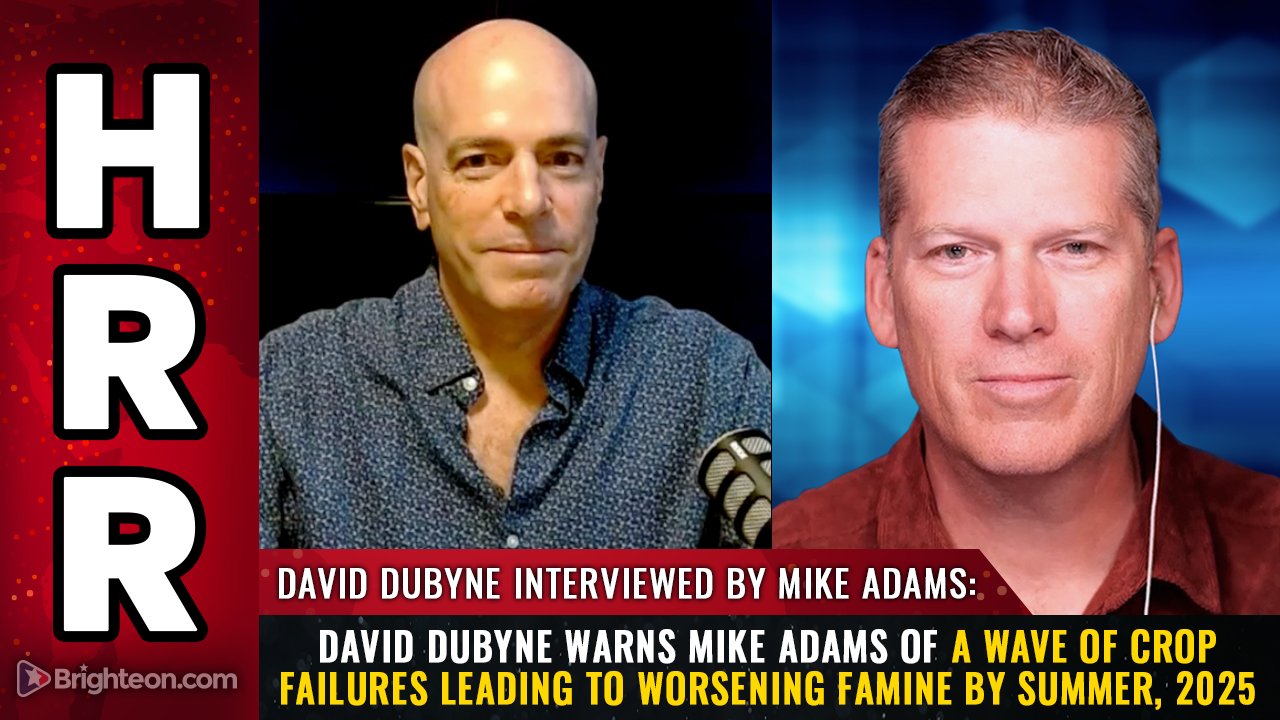Avoiding insurance scams: Tips every prepper and consumer needs to know
04/28/2025 / By Zoey Sky

- Insurance scams target unsuspecting victims, but knowing the warning signs can protect you. For staged car accidents, scammers will deliberately cause collisions, blame you and pressure you to settle quickly without police involvement. Always get a police report, never accept cash settlements on the spot and wait for official documentation.
- For fake health insurance plans, fraudulent ads will offer “cheap” coverage but provide no real benefits, leaving you uninsured when you need care. Verify plans through Healthcare.gov or your state’s insurance portal.
- Phantom insurance companies have fake insurers that lure victims with “too-good-to-be-true” rates, then disappear when you file a claim. Check licensing via the NAIC database and never pay in cryptocurrency or prepaid cards.
- With premium diversion scams, dishonest agents will pocket your payments instead of forwarding them to insurers, leaving you uninsured. Pay premiums directly through the insurer’s official website/app and confirm payments with customer service.
- After a disaster, scammers will pose as adjusters, demanding upfront fees and stealing personal data. Only work with verified insurers or FEMA. Secure your data by using strong, unique passwords and enabling two-factor authentication.
Insurance is a necessity, but it’s also a perfect hunting ground for scammers. Whether you’re juggling a car accident claim, securing health coverage or managing life insurance, fraudsters are lurking and ready to exploit your trust and hard-earned savings.
Fortunately, scams thrive on surprise and urgency. If you arm yourself with knowledge, you’ll quickly shut down fraudsters faster than they can hit “send” on a phishing email. (h/t to TheEpochTimes.com)
The staged accident: “Accidents” that smell fishy
A staged accident can take place even while you’re driving carefully and obeying traffic laws.
The scenario: On the road, a car will suddenly cut you off.
The driver may claim you caused the collision, push you to settle quickly without involving the police and even recruit “witnesses” who pop up suspiciously fast. If you experience this, you may be the victim of a staged accident.”
What to do:
Always request a police report. Real accidents don’t shy away from official scrutiny.
Never agree to a quick cash deal because scammers count on fear and confusion to force fast decisions. And if someone says the collision is “your fault,” stay calm and decline to settle until all parties have proper documentation.
Fake health insurance: The empty promise
The scenario: You may see a flashy ad that offers cheap plans with “government-approved” discounts. Once you enroll and pay upfront, you will then find out that the “insurance” won’t cover a $500 ER visit, let alone major surgery.
These schemes leave victims stranded when they’re most vulnerable.
What to do:
Double-check insurer legitimacy via Healthcare.gov or your state’s insurance portal. The Affordable Care Act mandates specific coverage requirements. If a “perfect” plan ignores deductibles or skimpy details, be wary.
Remember that “payments in gift cards only” means that cybercriminals want untraceable cash.
The phantom insurance company: Too good to be true
The scenario: “Low rates, guaranteed approval, 24-hour coverage!” The ad is irresistible, but only until you file a claim and learn the insurer never existed.
These fake providers vanish after stealing your money, leaving you uninsured and out of pocket.
What to do:
Always verify licensing through the National Association of Insurance Commissioners’ (NAIC) database. Don’t just trust a flashy website since licensed insurers display state credentials prominently.
Avoid demands for payment in cryptocurrency or through untraceable methods like prepaid cards. Legitimate companies accept bank transfers or credit cards.
Premium diversion scams: When your agent disappears
The scenario: An agent you’ve trusted for years suddenly “forgets” to renew your policy. You’re shocked when your claim is denied.
Worse, their number is disconnected. Premium diversion scams occur when carriers pocket your payments and vanish, leaving you legally uninsured.
What to do:
Always pay premiums directly to the insurer via its official website or app. Do not send cash to an individual.
After payment, confirm through the insurer’s customer service that it was received. If an agent acts urgently, delaying a “technical fix,” investigate the matter because they might be covering their tracks.
Fake “claims assistance” scams: Fraud in the wake of crisis
The scenario: Flood waters recede, and suddenly, door-to-door “specialists” offer to “maximize your insurance payout.” These alleged specialists might demand upfront fees, pressure you to sign unclear documents and vanish before the check clears.
These scams prey on disaster victims’ desperation.
What to do:
Your insurer or federal aid programs (FEMA, etc.) provide free assistance. Fraudsters exploit chaos, so ask for identification and verify them through official channels.
If they demand cash upfront, decline. Even legitimate adjusters don’t ask for fees before work begins.
Medicare/Social Security windfalls: Identity theft in disguise
The scenario: A call claims your Medicare benefits are suspended and immediately verifies your Social Security number and bank info to “reactivate” coverage.
However, the real motive is to steal your identity to open credit lines or hijack benefits.
What to do:
The Internal Revenue Service (IRS), Medicare and Social Security never call demanding account details. Scammers fake caller IDs, so hang up and dial Medicare (1-800-633-4227) or Social Security’s main line (1-800-772-1213) to confirm.
If uncertain, contact your state’s insurance fraud bureau.
Inheritance “windfalls”: The ancient relative tale
The scenario: “Your Aunt Matilda left you a $500k life insurance payout!” The news may sound promising, but it’s a lie.
Scammers invent distant relatives to extract “processing fees” or fake legal costs.
What to do:
Legitimate insurers don’t require upfront fees. Before “processing” anything, contact the company listed on the policy directly. Verify claims through an independent lawyer if needed.
If they ask for your bank details to “wire the payout,” your doubts are confirmed: They want to steal your personal data.
Cybersecurity: Your first line of defense
While protecting against scams involves vigilance, fraudsters also target your digital footprint.
Here are some tips to maintain cybersecurity:
Secure Password Practices
Use unique passwords for each account and enable two-factor authentication.
Shred paper documents
Identity thieves will dig through your trash. Shred bills, pre-approved credit offers and all documents with SSN, account numbers, or birthday before disposal.
Protect financial data
Never share personal info over the phone, email or social media, even if the caller “sounds official.” Banks won’t ask for PINs or passwords. (Related: Scammers using fake Telegram verification bots to steal cryptocurrency assets from unsuspecting victims.)
Disposing of devices
Old smartphones, computers or hard drives are a gold mine for data thieves if not properly erased. Remove all storage, delete files and use software like DBAN (Darik’s Boot and Nuke) to overwrite data.
Physical destruction works too. Just shred hard drives or burn memory cards.
Scammers excel at impersonating people you respect: insurers, government agents, even friends.
The golden rule? Find a skeptical balance. When pushy deadlines, unverified contacts and threats to “lose benefits” emerge, take a deep breath and verify the caller’s claims.
Stay alert and informed to keep scammers in their place.
Visit CyberWar.news for more information about other online scams.
You can also go to Health Ranger Store and Brighteon Store to find various products for your prepping needs.
Watch this clip for the truth behind Social Security fraud.
This video is from The Lindell Report channel on Brighteon.com.
More related stories:
Gift card company’s cybersecurity failures expose millions of customers’ sensitive data.
Credit card debt hits record $1.17 trillion, New York Fed research shows.
Cyber security threats: 10 Tips for safe internet browsing.
Sources include:
Submit a correction >>
Tagged Under:
conspiracy, crime, criminals, cyber war, cybercrime, cybersecurity, data breach, data privacy, deception, finance, fraud, glitch, hackers, homesteading, how-to, insurance, insurance fraud, insurance scam, off grid, online privacy, preparedness, prepper, prepping, prevention, privacy watch, scam, self-defense, survival, tips
This article may contain statements that reflect the opinion of the author
RECENT NEWS & ARTICLES
Homesteading.News is a fact-based public education website published by Homesteading News Features, LLC.
All content copyright © 2018 by Homesteading News Features, LLC.
Contact Us with Tips or Corrections
All trademarks, registered trademarks and servicemarks mentioned on this site are the property of their respective owners.




















